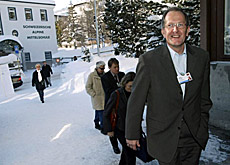Deiss defends trade talks in Davos

Switzerland's economics minister, Joseph Deiss, is hosting a meeting of 20 trade leaders on the sidelines of World Economic Forum summit to restart stalled trade talks.
Non-governmental organisations have strongly criticised Friday’s meeting in Davos, fearing it will only defend the interests of industrialised nations.
Negotiations stumbled last year at a meeting of the World Trade Organization in Cancun, Mexico, over the issue of agricultural subsidies to farmers in Europe and the United States.
“We think it’s a good opportunity for those ministers who are here to exchange their views and relaunch the discussions,” Deiss said.
By hosting the event, Switzerland hopes to add impetus to a recent US push to restart the current trade talks, also known as the Doha round.
But critics believe the agenda will focus on the demands of the WEF, rather than by those of ordinary people around the world.
Hidden agendas
Tony Juniper, the vice-chair of Friends of the Earth International, said many people were concerned that the Swiss meeting would be private and held with corporate members of the WEF.
“That is not open. That is not a public debate,” Juniper said at the Davos Open Forum, a public event that runs parallel to the WEF summit.
“The present issues around world trade [have] arisen [because] world trade policy is largely written by corporations,” he said.
“[It] continues to be used by corporations for commercial interests, which is why the environment and poor people continue to suffer.”
No decisions
Deiss responded by saying that the meeting was an informal event, at which no decisions would be made.
“Davos is a meeting point where people gather and we think if there are 10 or 20 ministers here, there is a possibility for them to gather informally,” Deiss said.
“There are no companies, no farmers and we [have a] possibility that negotiations or preparatory work could continue.”
Deiss also stressed that representatives from developing countries would also be involved.
Although trade experts have expressed doubts about the potential success of this week’s talks, there were increasing expressions of support from various countries represented at Davos.
Support from developing world
Youssuf Boutros-Ghali, the Egyptian trade minister, welcomed the Swiss talks as a much-needed first step.
However, he said that resuming the process of negotiations would require restoring trust between countries involved in the agricultural dispute.
“The core [of the talks] would be agriculture. I don’t expect us to agree on anything other than this,” Boutros-Ghali said.
“Doha needs to do for agriculture what the Uruguay round did for manufacturing.”
He called for a reassessment of how the WTO measured the worth of farmers around the world.
“Is a farmer in Tanzania or Senegal of the same worth as a farmer in France or the US?” he asked.
“Today he isn’t. I have 25,000 farmers in country X blocking 10 million farmers in a group of countries in Africa.
“If we do not address this equation in the Doha round, we all stand to lose.”
Washington has also given a clear sign that it wants to resume negotiations.
The US trade representative, Robert Zoellick, who is also in Davos, earlier this month wrote to all 146 WTO member countries, urging them to restart the talks.
swissinfo, Jacob Greber in Davos
Joseph Deiss has called a meeting of a number of global trade leaders in an attempt to resume stalled free-trade talks.
In December members of the WTO failed to reach agreement on a number of issues which would have restarted negotiations.
Talks broke down in September at the WTO’s last ministerial meeting in Cancun, Mexico.
Members differ over the issues of agricultural subsidies and tariffs on farm and industrial products.
The G-20 club of developing nations criticises rich nations for subsidising their own farmers.

In compliance with the JTI standards
More: SWI swissinfo.ch certified by the Journalism Trust Initiative











You can find an overview of ongoing debates with our journalists here . Please join us!
If you want to start a conversation about a topic raised in this article or want to report factual errors, email us at english@swissinfo.ch.